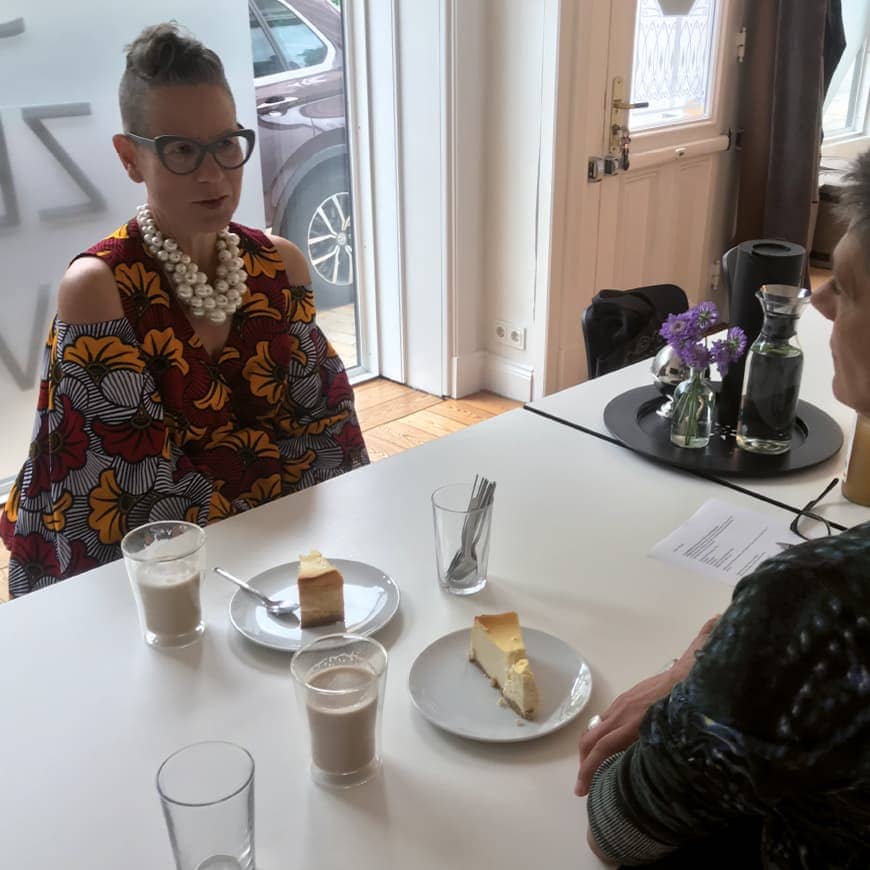B: Thank you so much for coming, Ulli. But before we start, you didn’t cycle here wearing those shoes, did you? Be honest!
U: Of course I did (she laughs) – it’s a breeze!
It wouldn’t be for me! And besides, the rest of your outfit looks pristine, too – which definitely wouldn’t be the case for many others after cycling 15 kilometers. But now let’s get a cappuccino and then we can get going.
B: Can you tell me a little about yourself?
U: I studied Photography at Folkwang University of the Arts in Essen. Afterwards, I thought that the USA was the land of my dreams. After four months, though, I came home practically broke – it really wasn’t for me. I got my first job through an ad that read “Photo editor looking for someone to organize and take photos”. And that’s more or less where I’ve been ever since. For thirty years and various magazines. With a thirteen-year stint as a freelancer in Great Britain, too.
B: And what about Zonta?
U: Zonta is an international women’s organization that originated in the USA. It’s a totally different world – very conservative – but also extremely interesting. Lawyers, doctors, bankers, businesswomen … we are a service organization, much like the Rotarians. At Zonta Club Hamburg Hafen, we support single mothers who are in the final semester of their degrees. They’re no longer eligible for government-funded student grants and the social welfare office won’t help either. And if the father or the girl’s parents don’t contribute, you fall right through the cracks. I could hardly believe that this loophole really exists. We help them to finish their studies. I’m currently vice president there.
photo:
Barbara Wegmann

B: And you’re also a real cycling enthusiast. That sounds like excellent time management.
U: Ah, cycling is a great way to get from A to B. And it’s definitely the quickest way to get around the city anyway. I can always “park” right outside. In Germany, cycling is freedom – and that’s also why I’m currently teaching a young Syrian girl how to ride a bike. Being outside in nature brings me incredible joy. I’ve just come back from a tour through the north, where I saw sprawling red poppy fields, cornflowers between wheat ears, a stork with a slow worm in its beak to feed its babies. Skylarks that accompany you. Huge concerts of frogs and toads. I can’t understand why anyone would want to cycle with earbuds. I love music, but I want to experience everything around me with all of my senses.
B: How much do you cycle every day?
U: Without luggage, 100 to 120 kilometers. But with luggage – and for the first two days I had to fight against a really bitter, force 5 headwind – I only managed 50km. The last stages were 80 to 90km.
And yeah, you’re delighted when you finally arrive!
Just don’t turn around.
B: And all that with your career? I bet you’re jam-packed there, too.
U: Well, I do get holidays – I’m a permanent employee, after all. I was actually due to be in Senegal just now – Dakar for the art biennale, which, of course, is not happening now. So then I was left asking myself what to do with this fortnight. The prospect of spending it at home wasn’t exactly exciting. I can also cycle here every day, but then I just didn’t want to turn back. That feeling of not turning back, just cycling on – I love it.
B: Speaking of time, what immediately comes to your mind?
U: That it’s a luxury.
Time is luxury.
B: To be able to do such things, your bike tours?
U: Yes, but luxury can also be a gray day in November. When you switch the TV on at 3 p.m. and put your feet up. Maybe even with a cup of delicious coffee … (she laughs) – that’s luxury. I really enjoy that. I don’t find it boring at all.
B: To daydream?
U: Sometimes, but not at home. I’m too restless there.
B: Has your understanding of time changed due to your illness?
U: In terms of lifetime, yes. I nearly died, after all. So I see everything that has happened since then as a bonus. Maybe it also makes you a bit more aware. But, of course, that’s also the age I’m at.
At 30, it never crosses your mind that you’ll be a pensioner one day … Oh God!
(she lets out a roaring laugh) Or that you might get ill or something. That only comes now. So it definitely is like “time momentum”.
B: Is time money?
U: Not for me. No way. Not in my private life. The reality of my life goes like this: I have my job – it has a specific time frame. I don’t have any children, no partner. So I can do exactly what I want with the rest of my life. You can look at it however you want – but that’s the way it is.
B: And you don’t seem to be unhappy with it.
U: (grins) Not at all. I’m kind of like a teenager. For example, if I decide to stay home one night, I start to think, “What have you missed out on? Was that a mistake?” Because, at the end of the day, one of my life mottos is
You only regret
the things you
DIDN’T do.
Slow is the new fast.
B: Is that also true of your travels?
U: Well, doing Europe in five days isn’t my thing. I have done a lot of long-distance traveling, like to Trinidad and Tobago. I would never have thought of squeezing in St. Lucia, too, “now that I’m here”. No. That’s already two islands – more than enough to see.
It’s also why I love hiking so much – it’s all about the slow pace, the time that things, the paths take. If I want to climb a mountain, I need two or three days. Then they’re gone – just for that one mountain. But, at least in my eyes, I’ve experienced it all the more intensely. It’s a different concept of time to that held by many others.
B: But are we even still allowed to be slow?
U: When it comes to hiking, you actually have to be. I once had a very interesting experience in this respect – I climbed Kilimanjaro – it’s a hike that takes several days. One evening, we met a really nice couple in the tent next to us. They were about 30 years old. I was in my mid-50s. They left before us sometime in the morning and we never saw them again on the route. But we did run into them again two weeks later – completely by chance – in a museum. I asked them how it was on the summit. It turned out they didn’t make it – they gave up. They were too fast. Kilimanjaro is nearly 6,000 meters high. And if you go too fast, you might be OK for a day. But the day after, you’ll start feeling the effects of altitude sickness. Or you’ll simply wear yourself out.
I listened to a talk on it by a British doctor in Nepal. His key statement was, “Older people have an advantage because they are slower.” They give themselves more time. To acclimatize. And that’s a huge advantage.
You can’t go at it with a sledgehammer.
B: What do time and creativity have to do with each other?
U: A lot! In terms of my profession, I’m the only one of four photo editors who collects photos. That’s a lot of work – it takes a lot of time. Of course, there are 80 or 90 things I might not need. But there are always gems in there that MIGHT just come in handy at some point. They trigger something that makes me think, “Cool.” “Cool idea.” “Cool motif. I’ll keep that.” But keeping things takes effort. Of course, I do it all digitally. But I also print it, crop it, file it in a themed folder and so on. It’s a lot of work. And a lot of time. But then again, it also saves time. If a theme comes up, I go straight to my corresponding folder and might just find something that fits. Or it’s the start of a thread you then unravel, which leads you to the solution. The cornerstone of an idea. And that takes time.
So when – like now – I’m working on the next issue of Soul Sister, I have around 15 themes to find images for. I can’t just rattle them off. One or two, maybe three themes – and then I do some mundane administration work. It really wears you out. You can’t just go at it with a sledgehammer.
But things that take time are never very popular. And then we’re still always reminded that “Time is money”. In my line of work, at least. Achieving more with fewer people in less time. That doesn’t make the quality better, though.
B: There’s one final, pressing question I just have to ask: what’s your favorite coffee?
U: Oh, I’m no purist – and I’m not a wannabe barista either … I love coffee with milk, cappuccino. Or an oriental mocha with spices and sugar. But slurping coffee from a paper or plastic cup on the run – that’s definitely not my thing. Especially with coffee like yours.
For me, to-go is an absolute no-go.
B: I couldn’t have put it better myself.
Ulli, thank you so much for this fantastic chat.




